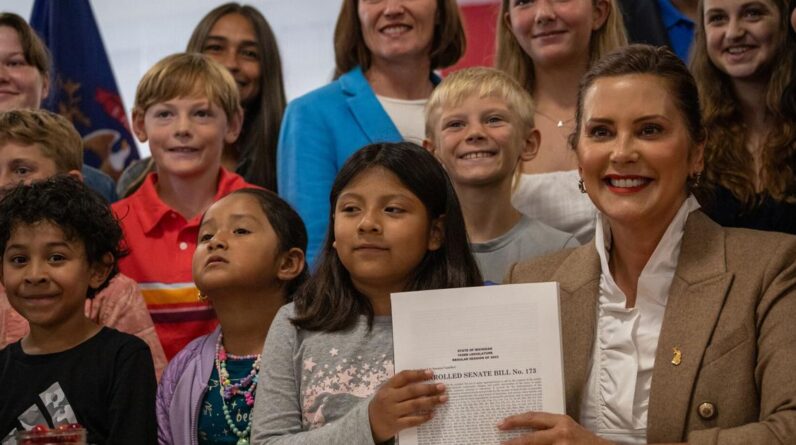
SUTTONS BAY – Shortly before signing Michigan’s $24.3 billion education budget, Gov. Gretchen Whitmer answered why she and Lansing’s top political leaders gathered at Suttons Bay High School to make it official.
For one thing, state Rep. Betsy Coffia, D-Traverse City, pushed for it, Whitmer said.
On the other hand, it sends a message about how everyone involved in drafting the legislation views the students of Suttons Bay Public Schools.
“Because the students in Suttons Bay, the little Norsemen, matter just as much as the little Trojans in East Lansing, or the kids in Saginaw, or the kids in the Soo,” he said. “This is about all Michigan kids, so I’m excited to be here.”
Whitmer, Coffia, Lt. Gov. Garlin Gilchrist and others spoke Thursday afternoon to a packed auditorium at the high school, with an audience of students, district officials and more. The governor and all who have spoken the bill touted its record level of investment, including the highest per pupil funding.
Highlights include funding to send up to 5,600 children over 4 to preschool for free in the fall, and plans to make preschool free for all students by the end of Whitmer’s second term in 2024. he said. This can save a family an average of $10,000 a year while giving children a solid educational foundation.
Another addition will save families money by making free school breakfasts and lunches available to all students, regardless of income, Gilchrist said. This should save families an average of $850 per year.
“And that’s real money everywhere in Michigan, and that’s going to make a difference at a time when things are so expensive,” he said.
It will also ensure kids are full and can focus on learning, said Grand Traverse County Commissioner Lauren Flynn.
On the higher education end, the budget will extend the Michigan Reconnect Scholarship to anyone 21 or older who has a high school diploma or equivalent, Gilchrist said. The program had been for people 25 and older and paid for a two-year degree from their district’s community college if they didn’t have a high school diploma.
Rural districts will also get a bus boost through a $125 million rural transportation equity fund, Coffia said. This will put districts that send buses thousands of miles each day to get students to school on a more even footing, allowing them to spend money on bus fuel on classroom programming.
The lineup of speakers included state Sen. Darrin Camilleri, D-Trenton, the chairman of the Senate Pre-K-to-12 Appropriations Subcommittee, and Rep. Regina Weiss, D-Oak Park, who works on appropriations ‘higher education and community colleges of the chamber. subcommittee
They provided more details on what is included in the budget, including:
More than an additional $2,000 per student for at-risk students, Weiss said; A higher level of funding and an “opportunity index” to boost districts with higher concentrations of poverty; Full funding of the state’s special education foundation grant; Allowing Native students to list their tribal affiliations in demographics and allowing districts to claim federal funding they have available, Whitmer said; Funding for tutoring, literacy support, math intervention and before and after school programming; Adding a personal finance class as a graduation requirement, starting with eighth graders in the fall; A rainy day fund for schools to ensure financial stability; Expand the MI Future Educator program, which provides scholarships to education students and stipends to student teachers; Continue funding for the Michigan Success Scholarship, which reduces the cost of community, public and private colleges.
It’s a budget that Whitmer said will make a real difference in the lives of students across the state, as well as on their college campuses, during the ceremony, which lasted about 40 minutes.
“I want every parent in Michigan to know that from the day your child enters preschool until the day they graduate from high school, we’ll have their backs and yours,” he said. to say.
The budget faced some criticism from Republicans who said some elements, such as expanding the school lunch program, would benefit even wealthy families. Among them was Rep. John Roth, R-Interlochen, who voted against the budget because of a number of concerns, including school lunches and electric buses that he argued in a statement are unreliable for in rural districts.
Whitmer insisted the spending plans are sustainable during a brief question-and-answer session after signing the bill, noting the state has paid down massive debts and passed budgets that don’t create structural deficits.
Suttons Bay Public Schools Superintendent Casey Petz said Whitmer coming to the district, along with all the other elected officials who came, sent a message that all Michigan students matter, no matter where they are. live
“This is an equity issue where districts can solve some of their problems related to special education or at-risk students or transportation or food service, this budget shows that those priorities will be funded and maybe a a little easier to solve. us this year,” Petz said.
[ad_2]
Source link





